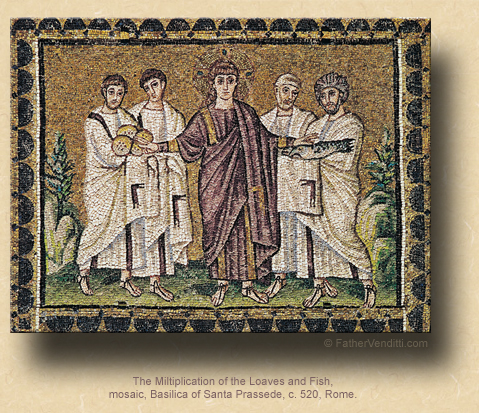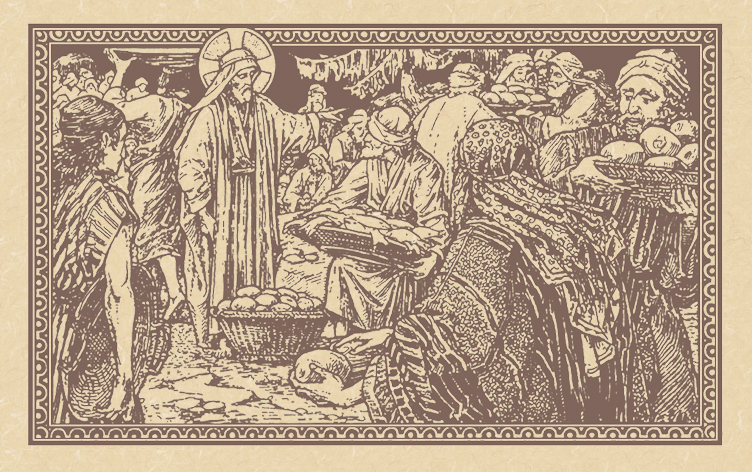It's Not a Symbol; It's a Sacrament.
The Seventeenth Sunday of Ordinary Time.
Lessons from the secondary dominica, according to the ordinary form of the Roman Rite:
• II Kings 4: 42-44.
• Psalm 145 10-11, 15-18.
• Ephesians 4: 1-6.
• John 6: 1-15.
The Tenth Sunday after Pentecost.
Lessons from the dominica, according to the extraordinary form of the Roman Rite:
• I Corinthians 12: 2-11.
• Psalm 16: 8, 2.
• Luke 18: 9-14.
FatherVenditti.com
|
 11:21 AM 7/29/2018 — If you can't figure out that the miracle of the loaves and fish is a prefiguring of the Holy Eucharist, you need some sort of remedial class. It’s painfully obvious that this event of feeding five thousand people with five pieces of bread and two fish has little to do with hunger or magic tricks as it does with feeding the world with the Body and Blood of Christ. 11:21 AM 7/29/2018 — If you can't figure out that the miracle of the loaves and fish is a prefiguring of the Holy Eucharist, you need some sort of remedial class. It’s painfully obvious that this event of feeding five thousand people with five pieces of bread and two fish has little to do with hunger or magic tricks as it does with feeding the world with the Body and Blood of Christ.
And there is the symbolism of the Holy Eucharist all over this passage. For example, the passage beings with a reference to our Lord healing the sick. Why? Because in order to receive Holy Communion one must be free from sin.
When our Lord asks Philip what to do as a test, and Philip answers that the five loaves and two fish that Andrew begged off a young boy won’t be enough, our Lord presses them on, reminding them that what they are going to accomplish will be done by His power, not their own.
Now, in this account by the Blessed Apostle John, our Lord blesses the bread and distributes it Himself;—that's because of the particular messianic theme of John's Gospel—but, in the other Gospels we are told that our Lord gave the bread and fish to the Apostles to distribute; he doesn’t distribute it himself. That’s because Christ entrusts the Holy Eucharist to his Church, particularly his priests, without whom there could be no Eucharist.
Then Saint John goes on to tell us that they all ate and were satisfied, because what was distributed was “more than they could eat.” Of course it was, because the Body and Blood of the Lord is not food in the conventional sense, but spiritual food: the actual life of the risen Savior. No ordinary food could satisfy that completely. And it wasn’t just some who were satisfied, nor even most: the Gospel says that all were satisfied, because the Eucharist is the remedy for all sin, for all people.
And when it was all over, they took up twelve baskets of leftovers, in much the same way that we keep “leftover” particles of the Blessed Eucharist in our tabernacles in church. And the baskets are left over because the Eucharist, once we partake of it, cannot remain dormant within us, but must be carried with us into the world, so that the life of Christ which we receive can be shared with everybody.
And when the baskets are collected, Jesus and his disciples move on, because the grace of the Eucharist must be spread to everyone. No one can attain heaven without it, as our Lord Himself says toward the end of this chapter, "…you can have no life in yourselves, unless you eat the flesh of the Son of Man, and drink his blood" (6: 54 Knox).
Of course, our Lord’s disciples were not thinking of these things when our Lord performed this miracle;—and he did it twice—they were probably thinking, “Gee, what a great trick. Wish I could do a trick like that.” Whether they remembered it on the night of the Last Supper we’ll never know. But they certainly remembered it later, and so did the Fathers of the Church. Saint Jerome, in the fourth century, wrote,
The multiplication extended itself beyond that which was necessary, so that twelve baskets remained, one for each Apostle. The Apostles had not yet received the power to consecrate and distribute the Bread of Heaven, the Eucharist; yet Jesus, with a symbolic act, to nourish the hungry crowd, did not create new food, but took that which was in the hands of his disciples, and blessed it.
It explains a great deal about the Holy Priesthood and the sacraments: the priest is necessary to perform the mysteries, but it’s the power of Christ that makes them happen. And even in our own individual lives, everything we do that’s good is done by the grace of God acting through us.
But, a more salient point on which to reflect, I think, is the fact that our Lord does not supply all of this miracle Himself: He still chooses to require the raw materials from us, just as He used the loaves and fish, meager and insufficient as they were, to feed the multitude, which surely points to the fact that grace is not completely a gift, but relies on our own efforts to make it work within us. And when we are open to receiving that grace, we can do what we were tempted to think was impossible.  We can confront, for example, some moral teaching of the Church and say to ourselves, “Well, I can’t do this; it’s impossible!” almost as impossible as feeding five thousand people with five loaves of bread and two pieces of fish. What makes it possible, of course, is Christ, who said, "With God, all things are possible." We can confront, for example, some moral teaching of the Church and say to ourselves, “Well, I can’t do this; it’s impossible!” almost as impossible as feeding five thousand people with five loaves of bread and two pieces of fish. What makes it possible, of course, is Christ, who said, "With God, all things are possible."
And so it must be with us. There is no burden that the Gospel imposes on us that cannot be met with the grace of Christ. Remembering that at all times, especially in times of temptation, can make all the difference.
We profess our faith at the Holy Mass on Sundays because the Eucharist is not fellowship, it's a sacramental reality; only those who truly believe are allowed to partake of it, because it is real and not just a symbol. And it's important to note that, in the new translation, we no longer say “We believe…,” but “I believe…,” and not simply because that's what the Creed actually says, but because it's at this point that Holy Mass ceases to be a mere communal celebration, but imposes on us an individual decision: I—and no one else—am responsible for seeing that my reception of Holy Communion is worthy. I—and no one else—must confront the Blessed Sacrament of our Lord's Body and Blood, Soul and Divinity, and question the state of my soul to receive it, and whether I should have confessed my sins to a priest first. I—and no one else—must decide if, when I approach for Holy Communion, I really and truly understand what it is I'm presuming to receive, or whether I'm just another lemming in that multitudinous throng that shuffles forward to receive simply because that's what you do at that time in the Mass.
In the final analysis, it's up to each of us as individuals to decide what's in our hearts whenever we are privileged to be present at the miracle that is the Holy Sacrifice of the Mass, and whether we can sing, along with King David in our Responsorial Psalm today: “Aperis tu manum tuam, Dómine, et sátias nos”—“The hand of the Lord feeds us; He answers all our needs.”

|

